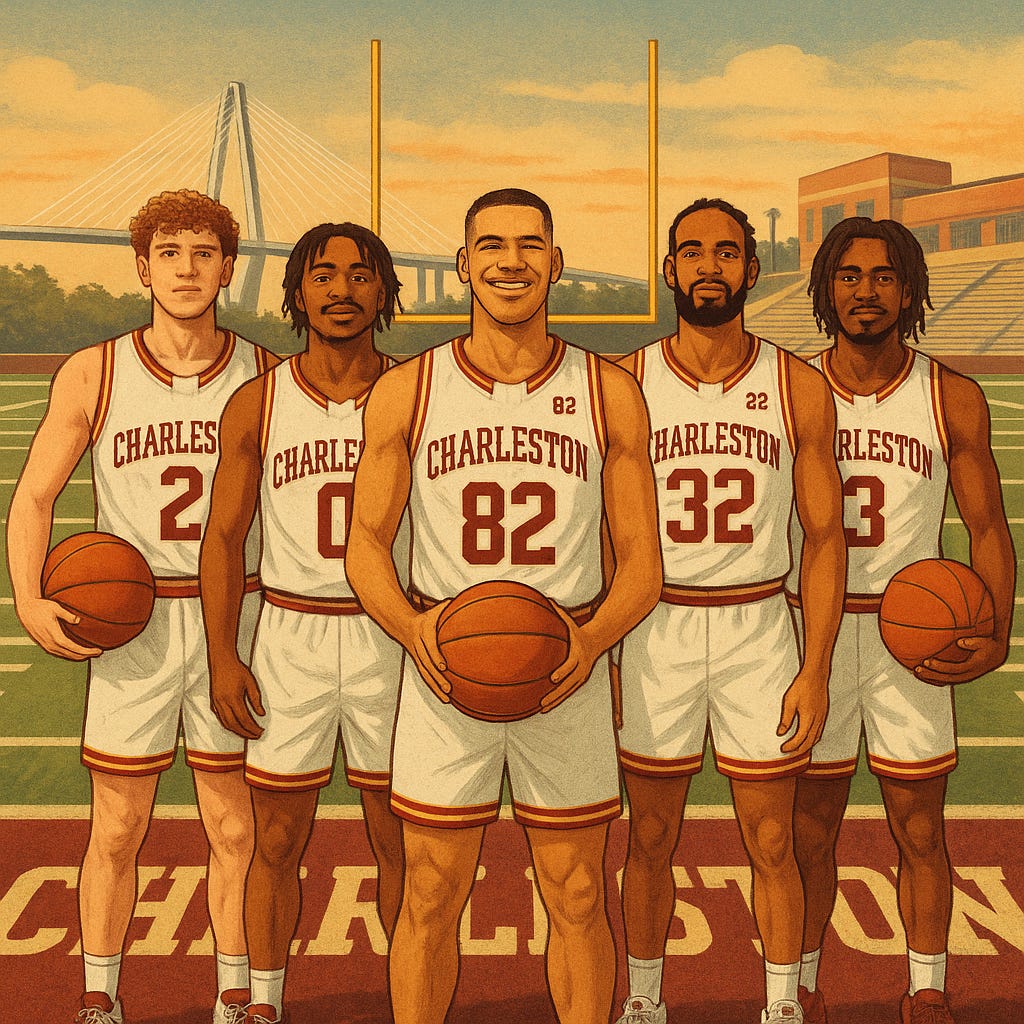No Football? No Problem: Why College of Charleston Is Built for the NIL Era
College football Saturdays are here. In Charleston, there’s no kickoff clock, no depth-chart drama… and that’s no problem.
In 2025, roster building is about money as much as schemes. The House settlement opened the door for schools to share roughly $20.5 million per year directly with athletes starting this season. That money won’t split evenly. Industry estimates say most of it will be funneled to football, with a thinner slice to men’s hoops and scraps for everyone else.
That’s where Charleston’s “no football” reality becomes a competitive edge.
Follow the money
One widely shared early estimate inside the industry broke it down like this: ~75% to football, ~15% to men’s basketball, ~5% to women’s basketball, ~5% to the rest. You can quibble with the exact math, but not the direction of travel. Football is the cost center; everything else gets what’s left.
Vendor data points the same way. Opendorse’s year-four snapshot projects that roughly 84% of rev-share dollars will go to football and men’s basketball at many schools. Translation: if you run an FBS program, the lion’s share is already spoken for before your Olympic-sport coaches even open a spreadsheet.
Charleston doesn’t have that drain. Every dollar we raise and deploy can move the needle where it matters on campus.
The blueprint is hiding in plain sight
Look around the non-football neighborhood:
VCU: Administrators have publicly pegged their annual athlete-pay commitment in the $4–5 million range under the new model—and VCU doesn’t field football. That money can be targeted to hoops and depth sports without a scholarship-heavy roster eating first. VSCH higher Education
Big East schools (another non-football set): A Power-conference AD flatly said some of them can “pay $6 million or more” to men’s basketball alone under revenue sharing. If you’re not carrying football, you can go all-in on your bell cow. Yahoo Sports
Davidson and Dayton: They do play football—but in the Pioneer Football League, the NCAA’s non-scholarship FCS conference. That’s a very different budget picture than FBS scholarship football. It keeps resources pointed to where those schools win season after season: basketball. pioneer-football.org
File Charleston with that group: schools that either don’t have football at all, or don’t have the kind of football that swallows a department. That’s a lane you can actually drive in.
What it means in the portal-and-pay era
This is not about pretending budgets don’t matter. They do. It’s about efficiency.
At a typical FBS school, the rev-share pool and NIL ecosystem have to satisfy 85 scholarship football players, a practice roster, position groups, and a coaching staff building two-deep depth at every spot. By the time men’s basketball gets its share, you’re often talking about a smaller pie for 13 scholarships than fans assume—then everybody else fights for crumbs.
At Charleston, the pie isn’t any bigger; it’s less diluted. A dollar targeted to men’s basketball moves recruiting, retention, and on-court competitiveness more here than it does at a comparable Power 4 program weighed down by football commitments. That’s not spin. It’s reality.
Add in the new flexibility to pay athletes directly—again, roughly $20.5M per school per year as a cap to start—and you see the pathway for true mid-major bite. If you don’t have to fund a football machine, you can put real fuel in your basketball engine.
So… a quiet Fall?
Sure. No Saturday football scoreboards here. But Charleston’s calendar has always hit different. Our slow autumn sets up a noisy winter.
No football isn’t a gap to explain away. It’s an advantage to emphasize. And when that’s combined with our incredible tradition, recent athletic success, and Charleston’s status as a world-wide destination city, it puts CofC on a completely different level.
See you at TD Arena later this year. And maybe bring some earplugs. The winter’s going to be loud.
Support CofC Student-Athletes
Donate to the STARR Fund — 100% tax-deductible.
Business Partnership — Partner with a student-athlete to promote your business.
CougShare Vendor Switch — Switch a vendor for a business service you already use; a percentage of the new revenue is donated back to CofC Athletics.
Questions or want to get started? Email tyler@thecharlestonedge.com.



